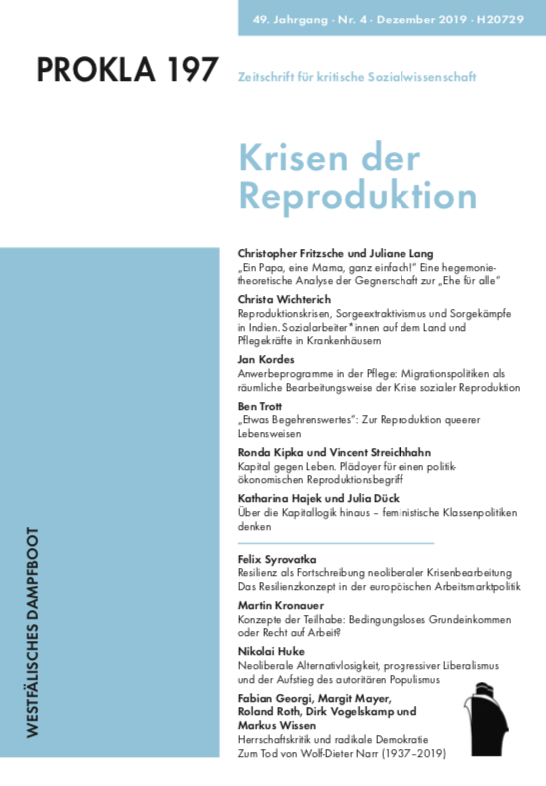Beyond the logic of capital - thinking feminist class politics
DOI:
https://doi.org/10.32387/prokla.v49i197.1849Keywords:
social reproduction theory, feminist theory, critique of capitalism, class strugglesAbstract
This article provides a critical evaluation of the Social Reproduction Theory (SRT), which conceptualizes social reproduction drawing on the theory of value by Marx. While we welcome the aim to think feminist and class struggles as intrinsically connected we also want to highlight some shortcomings of the SRT. An essentialist gender concept and an understanding of reproduction as a purely economic fact, as it is symtomatic for the SRT, last but not least also leads to political-strategic shortcomings. Instead of conceptualizing the discursive and ideological realm as fundamentally opposed to the seemingly more ‚materialistic‘ dimension of class struggles, we argue that gendered ideologies and subjectivities on the contrary should be understood as an important field for feminist class politics.
Downloads
References
Ariès, Philippe (1960): Geschichte der Kindheit. München 2007.
Bhattacharya, Tithi (2015): How Not To Skip Class: Social Reproduction of Labor and the Global Working Class. In: viewpoint magazine Nr. 5. URL: http://www.viewpointmag.com/2015/10/31/how-not-to-skip-class-social-reproduction-of-labor-and-the-global-working-class, Zugriff: 24.20.2019.
– (2017): Social Reproduction Theory. Remapping Class, Recentering Oppression. London.
Bock, Gisela/Duden, Barbara (1977): Arbeit aus Liebe – Liebe als Arbeit. Zur Entstehung der Hausarbeit im Kapitalismus. In: Gruppe Berliner Dozentinnen (Hg.): Frauen und
Wissenschaft: Beiträge zur Berliner Sommeruniversität für Frauen. Berlin: 118-199.
Donzelot, Jacques (1980): Die Ordnung der Familie. Frankfurt/M.
Ferguson, Susan (o.J.): Social Reproduction: What`s the big idea? URL: http://www.plutobooks.com/blog/social-reproduction-theory-ferguson, Zugriff: 24.10.2019.
Ferguson, Susan/McNally, David (2013): Capital, Labour-Power, and Gender-Relations: Introduction to the Historical Materialism Edition of Marxism and the Oppression of Women. In: Vogel, Lise: Marxism and the oppression of women: toward a unitary theory. Leiden–Boston, xvii-xl.
Foucault, Michel (1983): Der Wille zum Wissen. Sexualität und Wahrheit I. Frankfurt/M.
Hausen, Karin (1976): Die Polarisierung der „Geschlechtscharaktere“. Eine Spiegelung der Dissoziation von Erwerbs- und Familienleben. In: Werner Conze (Hg.): Sozialgeschichte der Familie in der Neuzeit Europas. Neue Forschungen. Stuttgart: 363-393.
Kipka, Ronda/Streichhahn, Vincent (2019): Kapital gegen Leben – Beiträge zur Theorie der Sozialen Reproduktion im Kapitalismus. Berlin.
Schultz, Susanne (2012): Biopolitik und Demographie. Eine staatskritische intersektionale Analyse aktueller deutscher Familienpolitik. In: Sänger, Eva/Rödel, Malaika (Hg.): Biopolitik und Geschlechterverhältnisse. Münster: 108-128.
Viewpoint Magazine (2015): Social Reproduction. Issue 5. URL: http://www.viewpointmag.com/2015/11/02/issue-5-social-reproduction/, Zugriff: 24.10.2019.
Vogel, Lise (1983): Marxism and the oppression of women: toward a unitary theory. (Dt. Übersetzung: Marxismus und Frauenunterdrückung. Auf dem Weg zu einer umfassenden Theorie. Münster 2019) Leiden/Boston 2013.
– (2019): Wiedergelesen: Hausarbeit neu gedacht. In: Luxemburg 2/2019. URL: http://www.zeitschrift-luxemburg.de/wiedergelesen-hausarbeit-neu-gedacht/, Zugriff: 24.10.2019.






